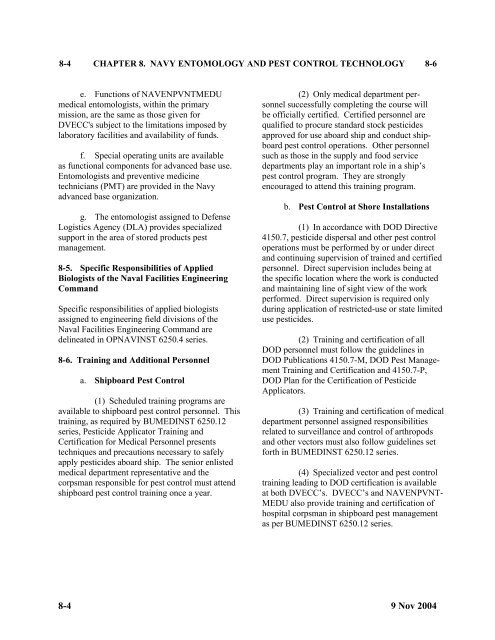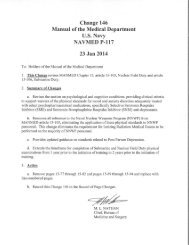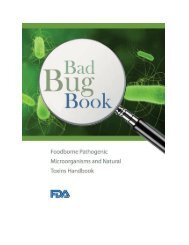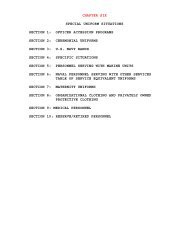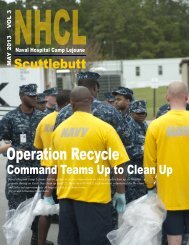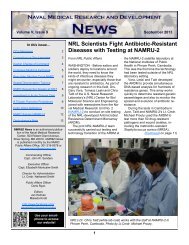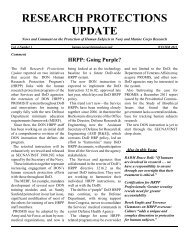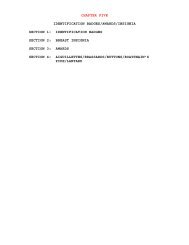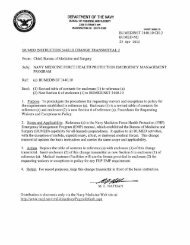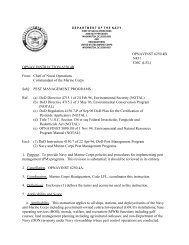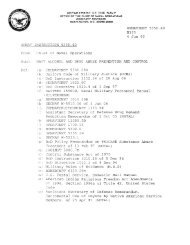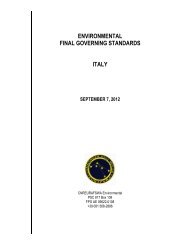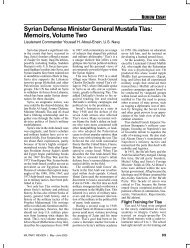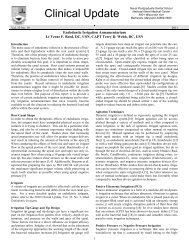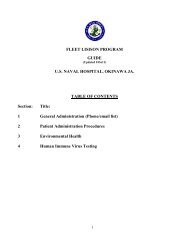NAVMED P-5010-8 - Navy Medicine - U.S. Navy
NAVMED P-5010-8 - Navy Medicine - U.S. Navy
NAVMED P-5010-8 - Navy Medicine - U.S. Navy
Create successful ePaper yourself
Turn your PDF publications into a flip-book with our unique Google optimized e-Paper software.
8-4 CHAPTER 8. NAVY ENTOMOLOGY AND PEST CONTROL TECHNOLOGY 8-6<br />
e. Functions of NAVENPVNTMEDU<br />
medical entomologists, within the primary<br />
mission, are the same as those given for<br />
DVECC's subject to the limitations imposed by<br />
laboratory facilities and availability of funds.<br />
f. Special operating units are available<br />
as functional components for advanced base use.<br />
Entomologists and preventive medicine<br />
technicians (PMT) are provided in the <strong>Navy</strong><br />
advanced base organization.<br />
g. The entomologist assigned to Defense<br />
Logistics Agency (DLA) provides specialized<br />
support in the area of stored products pest<br />
management.<br />
8-5. Specific Responsibilities of Applied<br />
Biologists of the Naval Facilities Engineering<br />
Command<br />
Specific responsibilities of applied biologists<br />
assigned to engineering field divisions of the<br />
Naval Facilities Engineering Command are<br />
delineated in OPNAVINST 6250.4 series.<br />
8-6. Training and Additional Personnel<br />
a. Shipboard Pest Control<br />
(1) Scheduled training programs are<br />
available to shipboard pest control personnel. This<br />
training, as required by BUMEDINST 6250.12<br />
series, Pesticide Applicator Training and<br />
Certification for Medical Personnel presents<br />
techniques and precautions necessary to safely<br />
apply pesticides aboard ship. The senior enlisted<br />
medical department representative and the<br />
corpsman responsible for pest control must attend<br />
shipboard pest control training once a year.<br />
(2) Only medical department personnel<br />
successfully completing the course will<br />
be officially certified. Certified personnel are<br />
qualified to procure standard stock pesticides<br />
approved for use aboard ship and conduct shipboard<br />
pest control operations. Other personnel<br />
such as those in the supply and food service<br />
departments play an important role in a ship’s<br />
pest control program. They are strongly<br />
encouraged to attend this training program.<br />
b. Pest Control at Shore Installations<br />
(1) In accordance with DOD Directive<br />
4150.7, pesticide dispersal and other pest control<br />
operations must be performed by or under direct<br />
and continuing supervision of trained and certified<br />
personnel. Direct supervision includes being at<br />
the specific location where the work is conducted<br />
and maintaining line of sight view of the work<br />
performed. Direct supervision is required only<br />
during application of restricted-use or state limited<br />
use pesticides.<br />
(2) Training and certification of all<br />
DOD personnel must follow the guidelines in<br />
DOD Publications 4150.7-M, DOD Pest Management<br />
Training and Certification and 4150.7-P,<br />
DOD Plan for the Certification of Pesticide<br />
Applicators.<br />
(3) Training and certification of medical<br />
department personnel assigned responsibilities<br />
related to surveillance and control of arthropods<br />
and other vectors must also follow guidelines set<br />
forth in BUMEDINST 6250.12 series.<br />
(4) Specialized vector and pest control<br />
training leading to DOD certification is available<br />
at both DVECC’s. DVECC’s and NAVENPVNT-<br />
MEDU also provide training and certification of<br />
hospital corpsman in shipboard pest management<br />
as per BUMEDINST 6250.12 series.<br />
8-4<br />
9 Nov 2004


